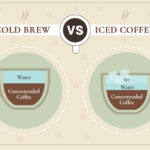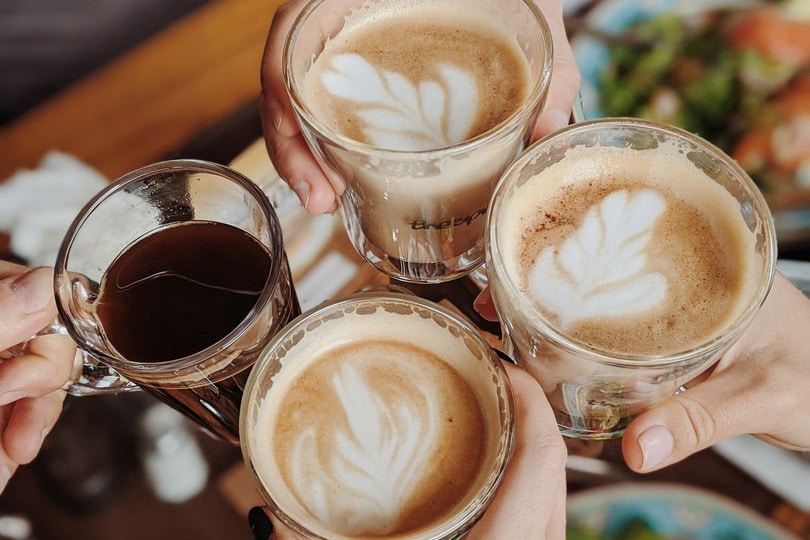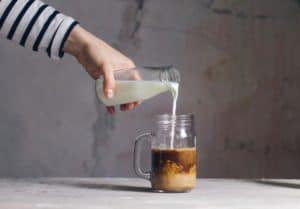
In the world of synthetic energy drinks, Zevia stands out with its simple ingredients that do not rely on sugar or artificial sweeteners for taste. Containing naturally sourced sweetener from the Stevia plant along with organic caffeine, Zevia looks like the healthiest choice among its sugary peers.
However, the FDA recommends that a healthy adult doesn’t need to exceed 400 mg of caffeine consumption per day, regardless how beneficial the drink may be otherwise.1 There is 120 mg of caffeine in a 12 oz. can of Zevia. But what does that tell us in relation to a cup of coffee? For reference, let’s compare the caffeine content of Zevia to the amount in similar drinks.
How Does Zevia Compare With Other Caffeinated Drinks?
| Popular Energy Drinks | Caffeine per bottle |
| Zevia | 120 mg |
| Red Bull | 150 mg |
| Monster Energy | 160 mg |
| Bang Energy | 300 mg |
| Rockstar Energy | 160 mg |
| NOS Energy | 160 mg |
| Reign Energy | 300 mg |
| Burn Energy | 150 mg |
| Mountain Dew Energy Drinks | 180 mg |
| Full Throttle | 160 mg |
| Spike Hardcore Energy | 350 mg |
Keep in mind that this isn’t an exact comparison because Zevia comes in a 12 oz. can whereas most of these drinks come in 16 oz. portions. Because of the inconsistency in size, Zevia actually contains as much caffeine as a Red Bull, but considerably less than a Spike.
Caffeine in coffee is a little more challenging to measure because it largely depends on the beans and the brewing method. For instance, an 8 oz. black cup of coffee brewed at home typically has 70-140 mg of caffeine. A black cup of coffee from Starbucks that’s the same size has around 180 mg of caffeine. Here’s how Zevia compares to common coffee drinks:
| Zevia | 120 mg |
| A typical cup of coffee brewed at home | 70-140 mg |
| Starbucks drip coffee | 180-415 mg |
| Standard Single Shot of Espresso | 63 mg |
| Single Shot of Espresso at Starbucks | 75 mg |
| Starbucks DoubleShot Espresso | 120 mg per 6.5 fl oz. can |
| Starbucks Cold Brew Coffee | 155-360 mg |
Just like how energy drinks are typically packaged in 16 oz. cans, these drinks come in different sizes, so the caffeine count isn’t exactly comparable. For instance, the Starbucks Doubleshot Espresso would contain 240 mg in a serving the size of a can of Zevia!
How Much Caffeine Should I Consume Per Day?
The FDA recommends no more than 400 mg of caffeine per day for healthy adults with no medical conditions that might react adversely to caffeine, such as high blood pressure. Under these guidelines, it’s safe to consume up to three cans of Zevia per day, although we don’t recommend that you let that become a habit.
If you regularly consume an excessive amount of caffeine, you could suffer from caffeine overdose or become intolerant over time. Symptoms of caffeine intolerance include anxiety, insomnia, restlessness, and muscle tremors. If you think you’ve become addicted to caffeine, consider a two-week detox to set your body back on the right path.
Is Zevia Healthy?
Considering that Zevia has no added sugar, artificial sugars, or artificial flavors, it’s one of the healthiest energy drink options available. Each of their formulas uses a handful of simple ingredients to create energizing, fruity blends that are naturally flavored and sweetened by Stevia.
It’s very unusual to find an organic beverage that’s zero calories, zero sugar, and doesn’t rely on weird chemicals for flavor. That being said, Zevia contains as much caffeine as some of the most popular energy drinks on the market, so it should be consumed in moderation to avoid the adverse effects of having too much caffeine.
Conclusion
Though Zevia contains as much caffeine as a Monster, it swaps the sugar for Stevia and uses plant-based, organic ingredients. It’s definitely a healthier choice than most, but keep in mind it’s still an energy drink that shouldn’t be excessively consumed.
















